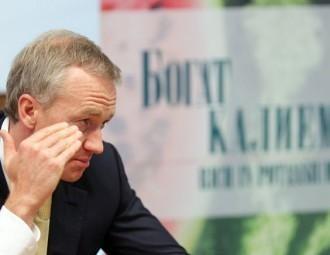Vladislav Baumgertner was freed from detention centre just before Putin’s visit to Minsk

Uralkalij CEO moved to house arrest on the night of 26 September; now his family members are one by one moving to Minsk, too. EuroBelarus issues another collective digest on Baumgertner’s case.
Vladislav Baumgertner, CEO of Russian potash producer Uralkalij, was moved from the detention center of the Committee for State Security (KGB) to a rented apartment in Minsk on the night between September 25 and 26, hours before Russian President Vladimir Putin was scheduled to arrive in Belarus to observe a joint military exercise. Putin was to visit Belarus on September 26 to observe a Belarusian-Russian strategic military exercise called West 2013 together with Aliaksandr Lukashenka. Aleksei Basistov, the executive's Russian lawyer, reported about his release, stating that Baumgertner will stay in the apartment under house arrest.
According to the lawyer, Mr. Baumgertner, 41, is under constant surveillance by KGB officers.
When reached by BelaPAN, Igor Kariagin, head of the Russian embassy's consular department, said that Mr. Baumgertner was staying in the apartment together with his mother, who had just flown to Minsk from Russia.
"He has not appealed to the embassy for assistance so far. Our request for permission to meet with him, which was filed with the foreign ministry, remains effective. The question is where and how [diplomats could meet with him] as he has been moved to house arrest," Mr. Kariagin said.
Let us recall that Mr. Baumgertner was arrested on August 26 as he was about to fly out of Minsk after a meeting with Belarusian Prime Minister Mikhail Miasnikovich. A few days later, Belarusian authorities instituted criminal proceedings against Russian billionaire and Uralkalij's top shareholder Suleiman Kerimov. On September 16, Russian Deputy Prosecutor General Aleksandr Zvyagintsev announced that the Investigative Committee of Belarus would hand over the investigation of the criminal case to the Russian Prosecutor General's Office.
Meanwhile Lukashenka and Putin, in fact, briefly discussed the conflict over Uralkalij case during their meeting on September 23 on the side-lines of a summit of the Collective Security Treaty Organization in Sochi, which wasn’t planned before. "Putin and Lukashenka had a conversation on the side-lines of the summit," Dmitry Peskov, Putin's spokesman said. "It was a brief face-to-face conversation. The situation regarding Uralkalij was touched on very briefly”, reports BelaPAN his words.
Some Belarusian experts link the release of Uralkalij CEO with the Kremlin’s demand. Thus, according to political analyst Valery Karbalevich "Baumgertner's release and placement under house arrest was the Russian side's strict condition. Had the Uralkalij CEO remained in jail, Putin would not have come to Belarus to observe the Zapad 2013 Belarusian-Russian joint exercise”, - he told to BelaPAN journalists.
He added that Minsk had been reluctant to make concessions and completely free Mr. Baumgertner. "As a result a compromise was found," said the expert. "Baumgertner is now not in jail but is not free either."
Mr. Karbalevich said that Minsk hoped to receive compensation from Uralkalij over the break-up of the Russian potash company's joint sales cartel with Salihorsk-based Belaruskalij, or even force Uralkalij to restore the alliance.
However, he added, the main reason for the Belarusian authorities' reluctance to send Mr. Baumgertner to Russia is Aliaksandr Lukashenka's "desire to get a psychological victory over Putin." According to the expert, Mr. Lukashenka enjoys receiving requests for concessions from the leader of a major world power.
-
03.01
-
07.10
-
22.09
-
17.08
-
12.08
-
30.09








































